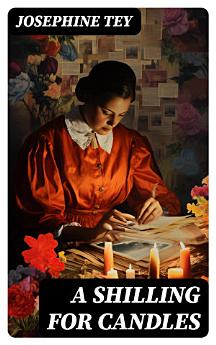A Shilling for Candles: Murder Mystery (Inspector Alan Grant Book)
Josephine Tey
Nov 2023 · DigiCat
Ebook
189
Pages
family_home
Eligible
info
reportRatings and reviews aren’t verified Learn More
About this ebook
In "A Shilling for Candles," Josephine Tey crafts a compelling detective narrative steeped in the rich tradition of English crime fiction. The novel introduces readers to the intricate web of motives and relationships surrounding a celebrated actress who is found dead under suspicious circumstances. Tey's deft use of literary irony and her exploration of social mores in 20th-century England elevate her mystery beyond mere genre conventions, probing into themes of identity and public persona. The prose is characterized by Tey's sharp wit and keen psychological insight, making the unraveling of the mystery as engaging as the characters themselves. Josephine Tey, born Elizabeth MacKintosh, was a trailblazer in the realm of detective fiction, often challenging the genre's conventions. Her own experiences in the theater and her critical perspective on fame and morality heavily inform the narrative of "A Shilling for Candles." Tey's background as a playwright and a novelist allowed her to intricately weave the complexities of human behavior into her storytelling, providing a nuanced perspective rarely seen in her contemporaries. Readers seeking an engrossing literary mystery that deftly addresses the allure and pitfalls of celebrity will find "A Shilling for Candles" particularly rewarding. Tey's masterful plotting and rich character development promise not only an enthralling whodunit but also a profound meditation on the fragility of fame. This novel is a must-read for enthusiasts of classic crime fiction.
About the author
Josephine Tey, a pseudonym used by Elizabeth MacKintosh (1896-1952), remains a distinguished figure in the golden age of British detective fiction. Born in Inverness, Scotland, Tey was exceptionally private, with little of her personal life seeping into public records — a stark contrast to her elaborate, character-driven mystery novels. Her literary career began as a physical education teacher writing plays under the name Gordon Daviot, but she gained acclaim in the crime fiction genre as Josephine Tey with works that showcased her knack for intricate narratives and psychological depth. One of Tey's notable novels, 'A Shilling for Candles' (1936), underscores her distinct approach that intertwines astute social observations with well-crafted whodunnit intrigue. The novel, which stands as a pillar of crime literature from the 20th century, lays out the perplexing case of a film star's death, defying conventional detective tropes and showcasing Tey's flair for subverting readers' expectations. Often celebrated for her unconventional protagonist Inspector Alan Grant, Tey's contributions to the classic detective narrative not only entertained but also pushed the boundaries of the genre, influencing both contemporaries and future literary voices in the realm of mystery writing with her sophisticated plots and nuanced characterizations.
Rate this ebook
Tell us what you think.
Reading information
Smartphones and tablets
Install the Google Play Books app for Android and iPad/iPhone. It syncs automatically with your account and allows you to read online or offline wherever you are.
Laptops and computers
You can listen to audiobooks purchased on Google Play using your computer's web browser.
eReaders and other devices
To read on e-ink devices like Kobo eReaders, you'll need to download a file and transfer it to your device. Follow the detailed Help Center instructions to transfer the files to supported eReaders.








